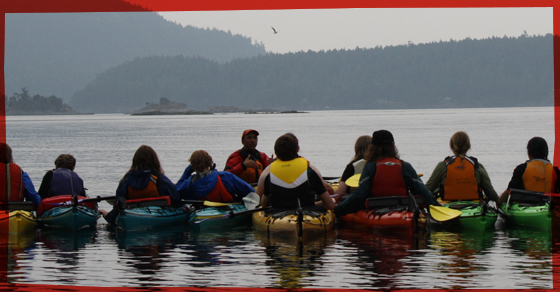Instilling a sense of wonder: Envirofund grant helps teens blend tech into the natural world

About this story
- Organization
Saturna Ecological Education Society - Region
Saturna Island, BC - Area of impact
- Type of investment
EnviroFund grant
On a typical school day, Sinead Strijack and her classmates could set out in kayaks or meander through the forest's depths with a shared sense of adventure to engage experientially with the lessons of the natural world.
They’d gather specimens from ponds and waterfronts on Saturna Island to explore the life of the Salish Sea.
This September marked the 10th year of the Saturna Ecological Education Centre (SEEC), attracting Grade 10 and 11 students from the Lower Mainland and Vancouver Island regions to the Gulf Islands to build their appreciation for the environmental sciences. This year, though, students get an even deeper dive into the natural world through technology, thanks to an Envirofund grant for digital sensors—electronic devices that will allow them to take the vital signs of Saturna’s natural health.
"People might think ecological schools are kind of hippie, but technology is important to us. It adds to the experience," says Sinead, who just started Grade 12 on Vancouver Island.
"There's more variety, you can get precise measurements and learn more about your surroundings when you know exactly what's going on." SEEC Vice Principal and teacher Martin Anevich puts it simply: “Sensors make what's invisible visible”. These new tools will help the young ecologists insert electrode-equipped sensors in soil, pond or seawater to monitor everything from sediment to drought conditions to salinity. Digital instruments like the Vernier sensors will complement student learning through the school’s hands-on activities to study biodiversity and connect experientially to nature.
SEEC has gained a reputation—and garnered several awards—as a “high touch, high tech” educational model, says Martin Anevich. The program, offered for one year to 10th and/or 11th graders from across Vancouver Island and Greater Vancouver, engages kids in projects like clam garden restorations - high touch, where they explore life at the lowest of winter tides in the wee hours of the morning; alongside Parks Canada staff; SFU graduate students; and local First Nations elders. In this context, these (high tech) instruments give the students vast access to information, and bolster their critical thinking, scientific and mathematical skills as they try to enhance the health of the habitats that surround them.
The Gulf Islands School Board (SD64) is a unique place where learning is connected to authentic opportunities in the community at large. Annually, experts from Mayne and Galiano Conservancies and graduate students from the University of Victoria come to work with students. The cooperative work becomes integrated into the teens’ science curriculum. Sinead recalls one project in which she and her classmates restored soil and helped plan a forest restoration that would balance natural light with foliage canopies, encouraging a greater diversity of species to return these spaces to good health.
"We went to Galiano and did a whole week of forest restoration, and I didn't even know that was a thing," she says. “Now I know it’s something I could pursue in the future.” A renewed focus on technology comes in response to the demands of the conservation and research industry, which requires strong capacities in technology among up-and-coming professionals.
While SEEC focuses on outdoor education the gamut of student experience reaches far beyond the ecological. Students from across Vancouver gain invaluable experience in their three days per week on Saturna to learn life skills: planning and preparing their own meals; living together in off-grid dorm buildings; pursuing civic leadership and social responsibility with community based mentors and service learning on a weekly basis. At the end of the year, each student cohort returns to their hometown schools, with an enhanced experience, lifelong friends and more confidence.
“It's intense, but it changes everyone in a really good way,” adds Sinead. “You learn school things, but since you live together three days a week and cook together, it makes you learn how to get along in a community. And there are so many different things to learn experientially. It's wide open.”